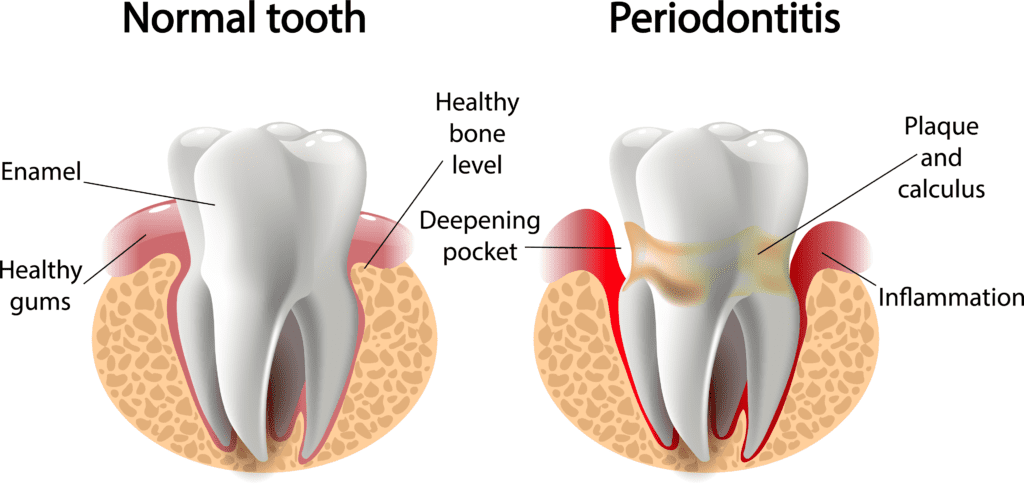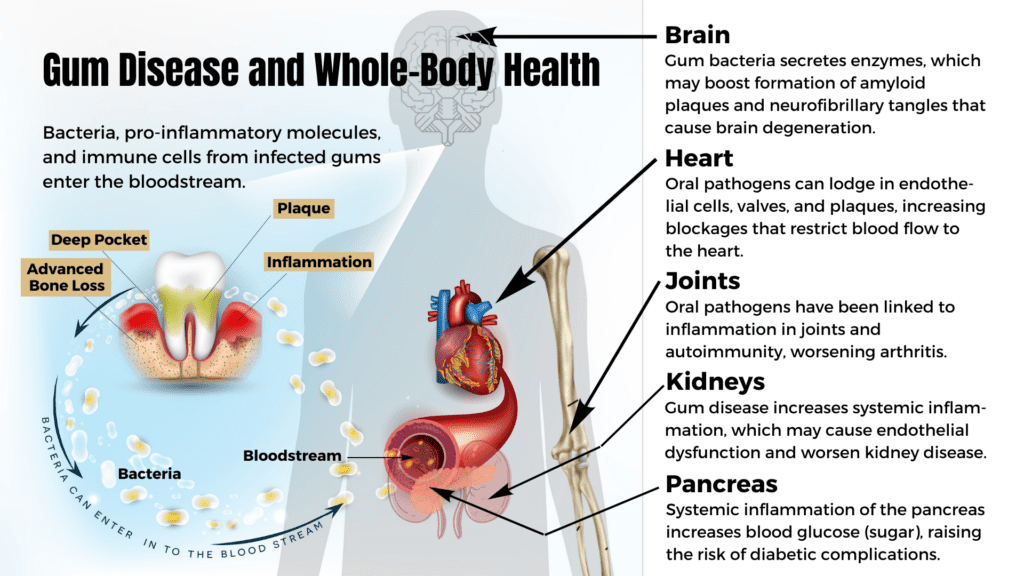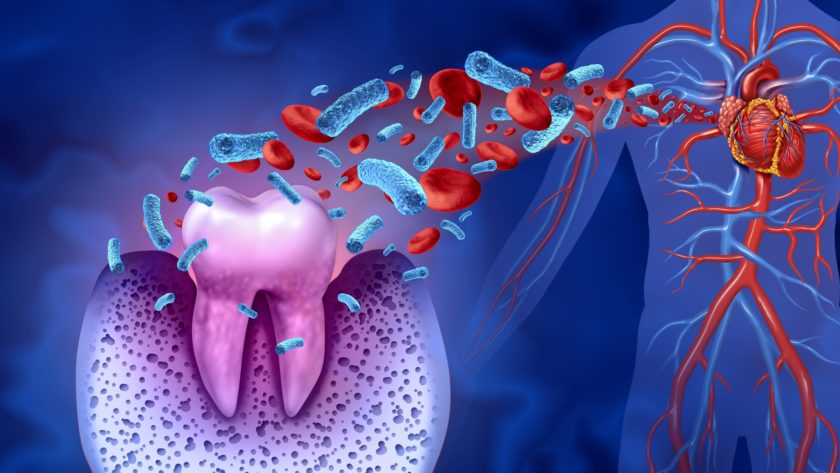Last week we went over strategies to keep our New Year’s resolutions. In a nationwide poll of over 1,000 adults last month, 26 percent said they wanted to improve their health in the new year. Typically, that means dieting and exercising for good heart health, but we also need to focus on our gums if we want to improve our general health.
The Culprits in Gum Health
There is increasing evidence that oral bacteria plays a significant role in systemic diseases like colon cancer, heart disease, diabetes, and now Alzheimer’s disease. Gum disease, also known as periodontal disease (periodontitis), is characterized by chronic inflammation of gum tissue, including the ligaments and bony structures that hold the teeth in place.
Gum diseases are the most common chronic human diseases and affect between 20 to 50% of people worldwide.
BACTERIA:
- Bacteria develop on the surface of the tooth root. It is one of the most common infections in humans.

*Calculus or tartar is a form of hardened dental plaque.
- Bacterial infections greatly affect cells within the arterial walls (endothelium) and cells involved in clotting (platelets) and fighting infections (monocytes and macrophages).
- Bacteria in your mouth can move via the bloodstream to your lungs and cause infections, such as pneumonia. This is more common in people with periodontal disease. When this occurs, the heart has to work harder to pump blood through your lungs, which are inflamed from the pneumonia, resulting in progressively more stress placed on the heart.
CHRONIC INFLAMMATION:
- Studies show that chronic systemic inflammation is associated with chronic disease. It can last weeks, months, or even a lifetime in some chronic inflammatory diseases.
- Acute myocarditis (inflammation of the heart muscle) is a potential condition for those with periodontal bacteria. Myocarditis can lead to rapid heart failure or cardiac arrest.

Gum Disease Linked to Other Conditions
In addition to inflammation of cardiac muscle tissue, the arteries are vulnerable to inflammation, which can lead to many conditions, such as:
- Heart disease (coronary artery disease): Inflammation from bacteria in the gums may eventually lead to narrowing of important arteries. That’s because inflammation ‘roughens’ the inner lining of arterial walls, whereby plaque is more prone to stick and build up along the wall.
- Chronic Heart failure (CHF): Researchers found that periodontal disease is highly prevalent in CHF patients regardless of the cause of CHF. In fact, clinicians may screen for periodontitis by asking CHF patients about bleeding of the gums, gum recession, and tooth-loosening. NOTE: There is no association between the severity of periodontitis and the extent of heart failure symptoms.
- Heart attack and stroke: Inflammation may cause the plaque inside blood vessels to crack, rupture, and dislodge, which could result in a blockage within an artery.
- Dementia/Alzheimer’s disease: A 2022 study found that poor periodontal health and tooth loss appear to increase the risk of both cognitive decline and dementia. A study published in Neurology (July 2023) found that gum disease and tooth loss were associated with brain shrinkage in the hippocampus – the part of the brain that controls thinking and memory and plays a role in Alzheimer’s disease. In another study, researchers found people who had gum disease declined six times faster in memory ability and linked this decline to the body’s inflammatory response.
- Type 2 diabetes: Patients with diabetes suffer from increased inflammation and are at greater risk of infections in general. Infections may also be more difficult to treat and take longer to heal. Research indicates that people with diabetes are at increased risk of developing gum disease, but the risk lowers if diabetes is managed.
- Rheumatoid arthritis: This type of arthritis is a chronic inflammatory disorder that attacks the lining of your joints and can damage other body systems, such as the skin, eyes, lungs, heart, and blood vessels.
- Cerebrovascular disease: This disease that affects the blood vessels and blood flow in the brain. Cerebrovascular disease is a major contributor to dementia in later life.
- Chronic obstructive pulmonary disease (COPD): Researchers discovered people with gum disease experience worsening symptoms of COPD. Studies also suggest oral disorders influence the course of respiratory infections like bacterial pneumonia, bronchitis, and emphysema.
- Spontaneous pre-term birth: Pregnant women are at increased risk of gum disease due to hormonal changes and increased blood flow.
The Cost of Gum Disease
- In a review of several studies, researchers found that gum disease increases risk of cardiovascular disease by about 20%.
- The researchers discovered that cardiovascular care costs were 10% to 40% lower in those that received adequate oral care for their gum disease compared to those who did not.
Gum Disease Symptoms
Regular visits to your dentist can help with early diagnosis and treatment of gum disease. Symptoms include:
- Persistent bad breath
- Swollen, red, or tender gums that bleed easily
- Highly sensitive teeth
- Pain with chewing
- Loose teeth or changes in bite
- Receding gums or sunken teeth
Treatment
Treatment can be as simple as cleaning the teeth above and below the gum line, called “scaling and root planing”. In more advanced cases, surgery is necessary.
What You Can Do
- Floss daily: Once of the most essential self-care health habits you can practice is flossing your teeth every day.
- Brush twice a day: The American Dental Association recommends brushing your teeth twice a day with a fluoride toothpaste for 2 minutes per session. Think one minute on your lowers and one minute on your lowers.
- Limit sugary beverages and snacks. Follow an anti-aging dental diet.
- Keep up with dental appointments, which include dental cleanings and exams every 6 months.

![]() Karen’s Fit Tip: If your goal is to improve your health this year, be sure good oral care is included along with a healthy diet, exercise, and stress management. It’s also imperative that dental and medical professionals emphasize oral care as an overall disease prevention strategy.
Karen’s Fit Tip: If your goal is to improve your health this year, be sure good oral care is included along with a healthy diet, exercise, and stress management. It’s also imperative that dental and medical professionals emphasize oral care as an overall disease prevention strategy.





